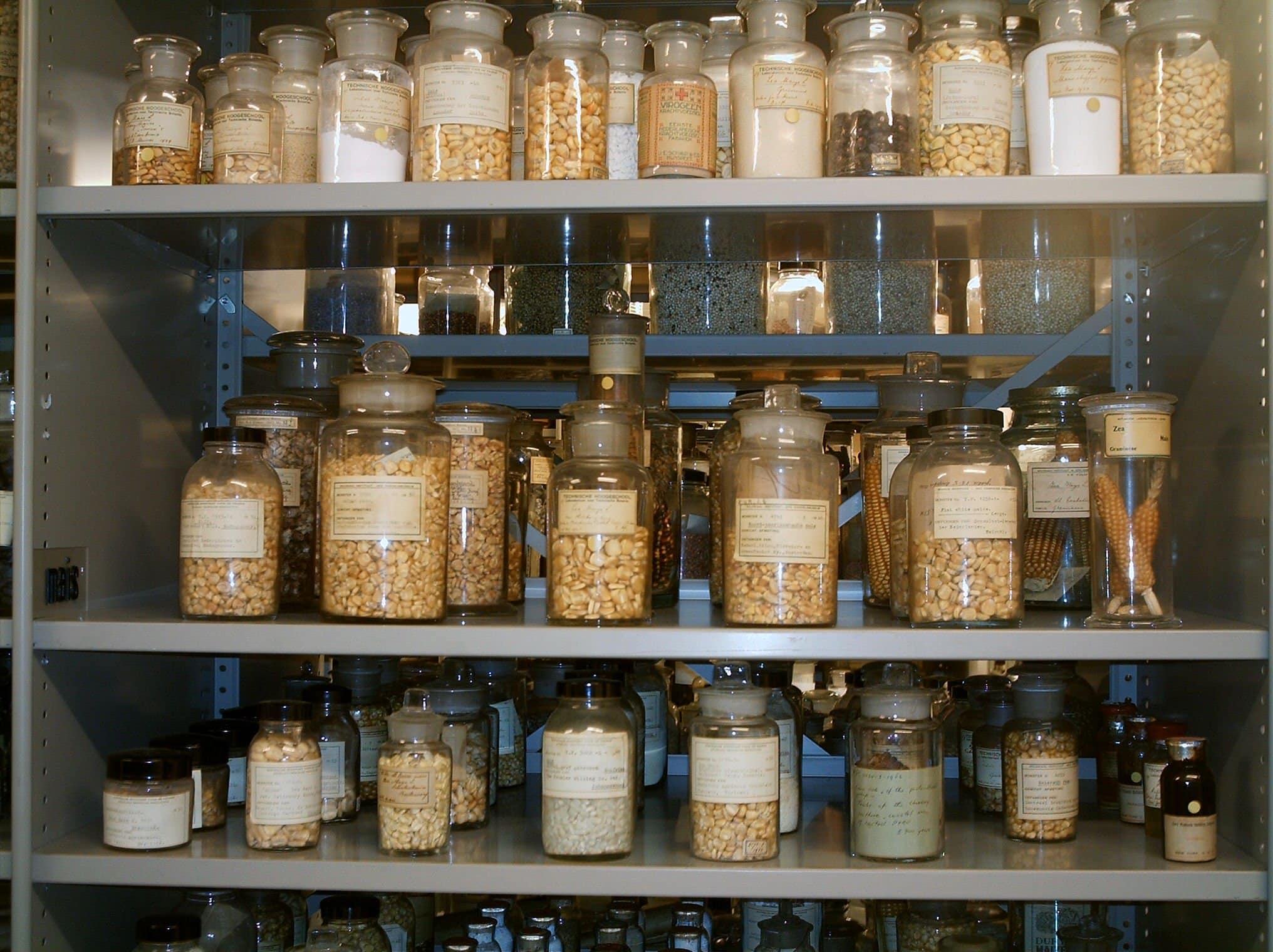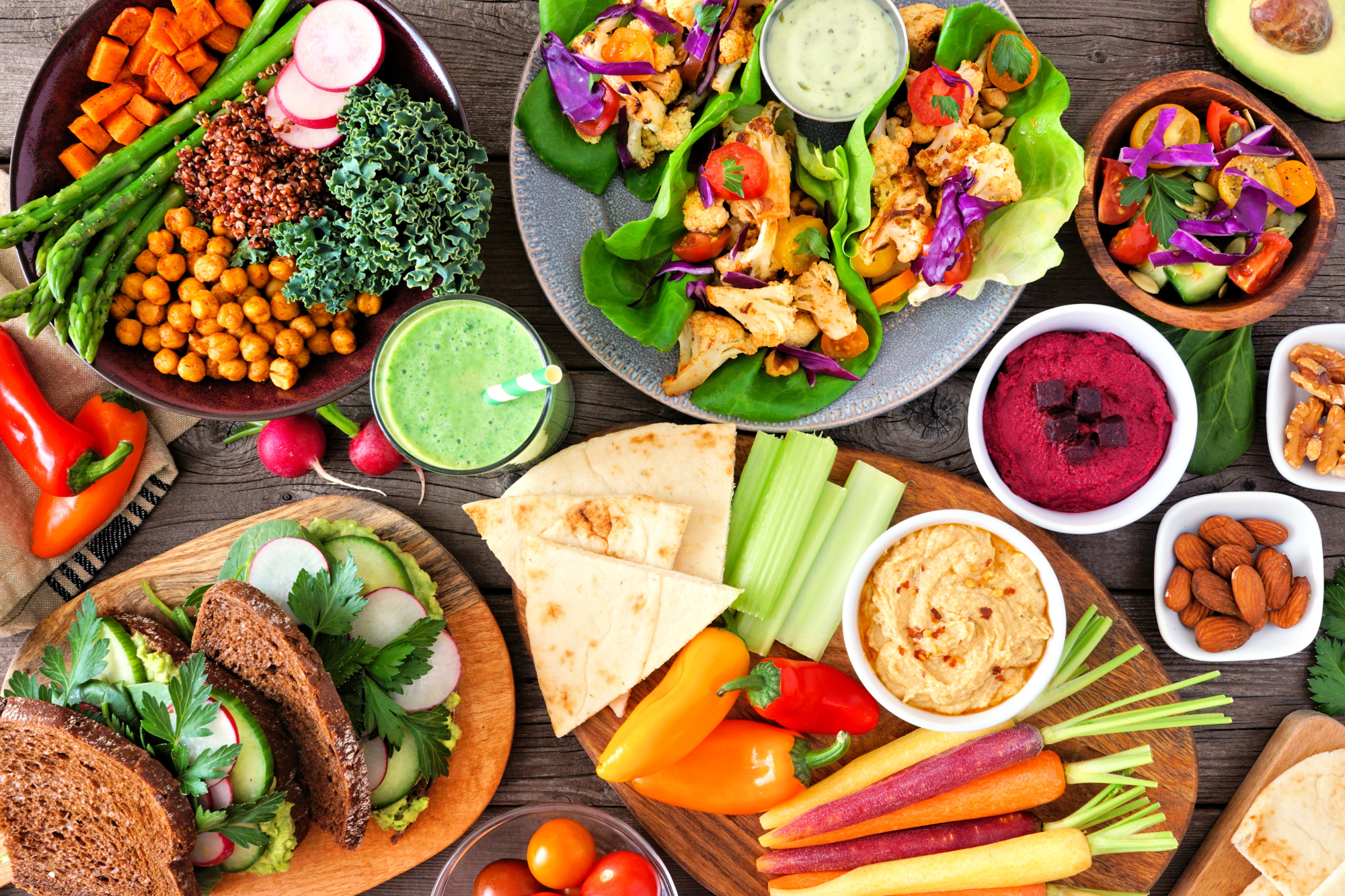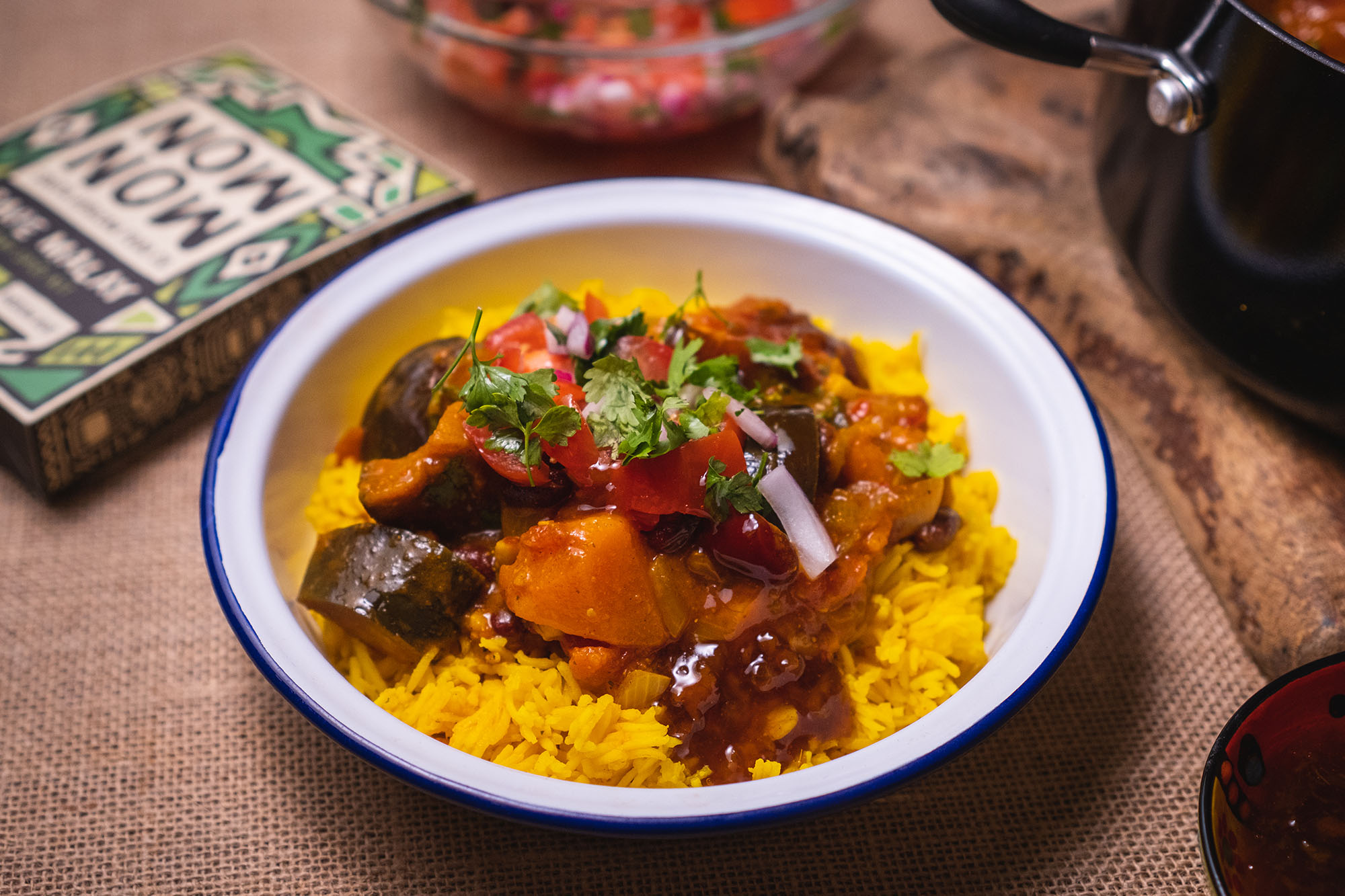Vegetables
Always have a few different veggies on hand. You don’t need to get fancy with recipes – if you’re out of inspiration, just chop them up and roast them, add them raw to a salad, or cook and blend them into a soup. There are hundreds of types of vegetables out there, but here are a few go-to categories:
- Leafy greens, e.g. spinach, lettuce, rocket, collard greens, swiss chard
- Cruciferous vegetables, e.g. broccoli, cauliflower, kale, brussels sprouts, cabbage, kohlrabi, bok choy, chicory, endive
- Root vegetables, e.g. carrots, sweet potatoes, fennel, beetroot, radish
- Nightshades, e.g. tomatoes, eggplant, bell peppers
- Edible plant stems, e.g. celery, asparagus, artichokes, kohlrabi greens
- Squash, e.g. butternut squash, pumpkin, zucchini, patty pans
- Allium, e.g. onions, garlic, ginger, leeks, shallots.
Grains
Whole grains should form a healthy foundation of a plant-based diet. Containing complex carbohydrates, fibre, and minerals, they’re your body’s main source of energy. Here are some common whole grains:
- Rice, e.g. brown rice, basmati rice, jasmine rice, wild rice, arborio rice
- Pasta (pasta is sometimes made with egg but is nearly always available as an egg-free version – you’ll need to check the ingredients), e.g. spaghetti, lasagne, macaroni, fusilli. Try whole-wheat pasta, which has a higher fibre and protein content.
- Other grains and cereals include bulgur, millet, quinoa, and oats.
- Grain-based products, such as whole-wheat bread, wraps, tacos, etc.
Beans and legumes
Beans and legumes are a key source of plant-based protein, and come in many different forms. Try and get a portion of beans or lentils every day.
- Whole beans (cook from dry, or buy canned), e.g. black beans, kidney beans, white beans.
- Chickpeas (cook from dry, or buy canned), a great addition to all kinds of meals.
- Lentils (cook from dry), e.g. black lentils or red lentils.
- Hummus, a spread made from chickpeas, which you can make yourself at home, or buy ready-made.
If you’re not used to eating beans and legumes regularly, you might find that you end up with more gas than usual – in that case, start by eating small portions regularly, to give your gut bacteria time to adjust, and always make sure that they are well soaked before cooking. Read more about beans and gas here.
Fruits
These should be a key part of your breakfast and a between-meal mainstay. Whole fruits are full of fibre and healthy sugars to keep you fuelled with energy. To keep your blood sugar stable, be sure to eat fruits in their whole form or in a smoothie. Try to avoid drinking too many fruit juices since the fibre has been stripped from the fruit and only the sugars and some micronutrients remain. Here are five fruit categories you should check out, although availability will vary a lot, depending on where you live:
- Citrus, e.g. lemons, oranges, mandarins, pomelos.
- Melons, e.g. watermelon, honeydew melon.
- Stone and tree fruits, e.g. apples, pears, peaches, mangoes.
- Tropical fruits, e.g. bananas, pineapples, kiwis, papayas, lychees, guavas.
- Berries, e.g. strawberries, raspberries, blueberries, grapes, blackberries
Herbs, spices, and & pantry essentials
No kitchen is complete without some basic herbs and spices, as well as sauces and condiments. Start experimenting with some of these widely available options, and you’ll discover a world of flavour.
- Dried herbs, e.g. basil, oregano, parsley, thyme, dill
- Fresh herbs, e.g. thyme, cilantro (coriander), basil, mint.
- Spices, e.g. cumin, turmeric, paprika, cinnamon, coriander
- Salt and pepper
- Oils, e.g. olive oil, sunflower oil, coconut oil
- Vinegars, e.g. balsamic vinegar, apple cider vinegar, red wine vinegar
- Vegetable stock
- Soya sauce
- Ketchup
- Mustard
- Salsa
- Curry paste
Nuts and seeds
A great wholefood snack to keep in your bag when you’re on the go, nuts and seeds are packed with proteins, healthy fats, carbohydrates, vitamins, and minerals to give you a boost whenever you need it. Some nuts and seeds are particularly useful for plant-based cooking: e.g. cashews to make creamy sauces, and ground flax seeds as an easy egg replacer.
- Walnuts, to add to your breakfast smoothie.
- Almonds, for healthy between-meal snacks.
- Cashews, for all things creamy and cheesy.
- Flax seeds and chia seeds, as a nutrient-dense egg-replacer.
Cans & jars
Sometimes it’s easiest and most cost-effective to buy foods that are already cooked and packaged for a long shelf-life. Here are some foods that we recommend buying in cans or jars:
- Coconut milk
- Diced tomatoes
- Tomato puree
- Olives
- Beans
- Applesauce
Meat & dairy substitutes
If you’re heading in the direction of a plant-based diet, keeping a handful of meat and dairy substitutes on hand is a comforting and convenient way to ease the transition. There are so many great products available nowadays, from plant-based milks, yoghurts, and cheeses to vegan meats and innovative ‘egg’ products. Try them out, and find your favourites.
- Plant milk, e.g. oat milk, soya milk, almond milk, rice milk
- Vegan yoghurt, e.g. soya-based or oat-based
- Plant-based cheese, e.g. nut-based or coconut-oil-based
- Meat alternatives, e.g. mince, sausages, schnitzels, bacon
Niche products
Certain go-to foods that vegans tend to use a lot are somewhat unfamiliar to most people with traditional diets:
- Nutritional yeast flakes, a great addition to sauces and other dishes for a nutty, cheesy flavour (and extra B-vitamins).
- Cashews, for all things creamy.
- Coconut oil, for baking and cooking.
- Seitan (made from gluten), a high-protein meat alternative with great texture and versatility.
- Tofu (made from soya beans), high-protein and low-calorie, and very versatile once you know how to use it.
- Tempeh (also made from soya beans), high in protein, with a great texture and nutty flavour, perfect as a meat substitute
- Chickpea flour, for vegan omelettes!
- Dried mushrooms, for umami-rich flavours
Breakfast, lunch and snacks
Keep some ready-to-eat products on hand for quick-and-easy breakfasts, lunches and between-meal snacks. Here are some suggestions as to the kinds of products you can look out for in your local supermarket (always check the ingredients to make sure it’s all plant-based):
Nibbles:
- Snack bars
- Mixed nuts
- Dried fruit
- Gingerbread
- Rice cakes
- Dark chocolate
Snacks:
- Olives
- Popcorn
- Nachos with homemade guacamole
- Some types of potato chips
- Papadums
- Sorbet (usually vegan)
- Soy- or nut-based ice cream
- Some types of cookies
Bread toppings and spreads:
- Nut butter (e.g. peanut or almond butter)
- Hummus
- Savoury spreads
- Dark chocolate spread
- Jam and marmalade
- Applesauce
Breakfast/Lunch:
- Bread (try wholewheat or rye)
- Crispbread
- Oatmeal
- Muesli
- Cornflakes
- Overnight oats with flax seeds or chia seeds
- Plant milks (e.g. soya, oat, almond, rice)
We hope this list inspires you to head out and stock your kitchen! Don’t go overboard though: you don’t need to buy everything that’s listed here – a regular plant-based shopping cart might include just a couple of items from each category. Happy grocery shopping and let us know what new plant-based discoveries you make!










